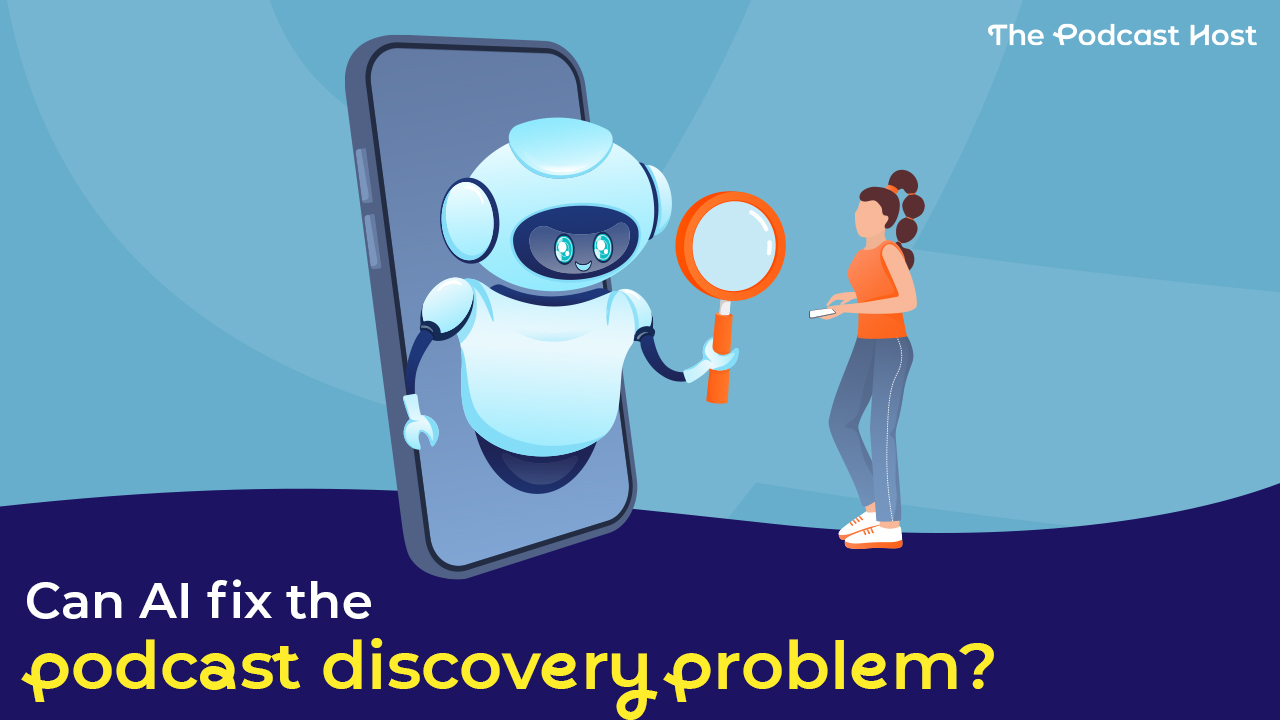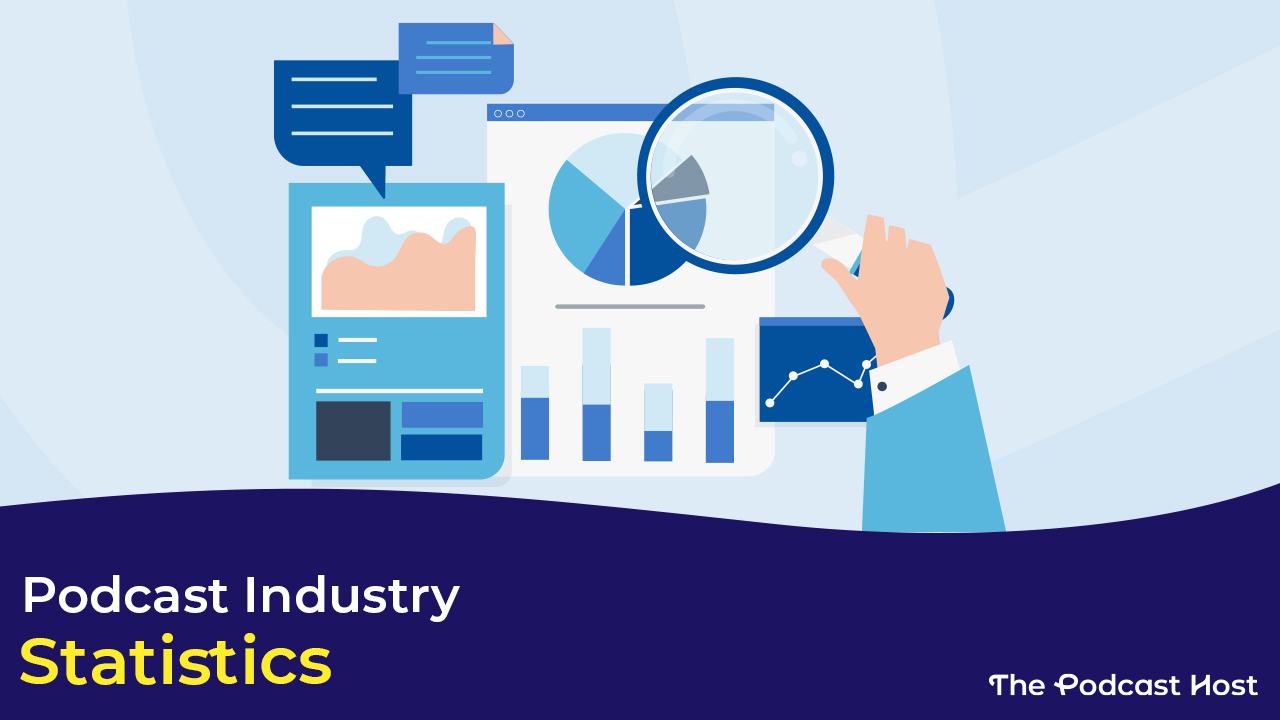Podcast Discovery Stats | How Do Listeners Discover New Shows?
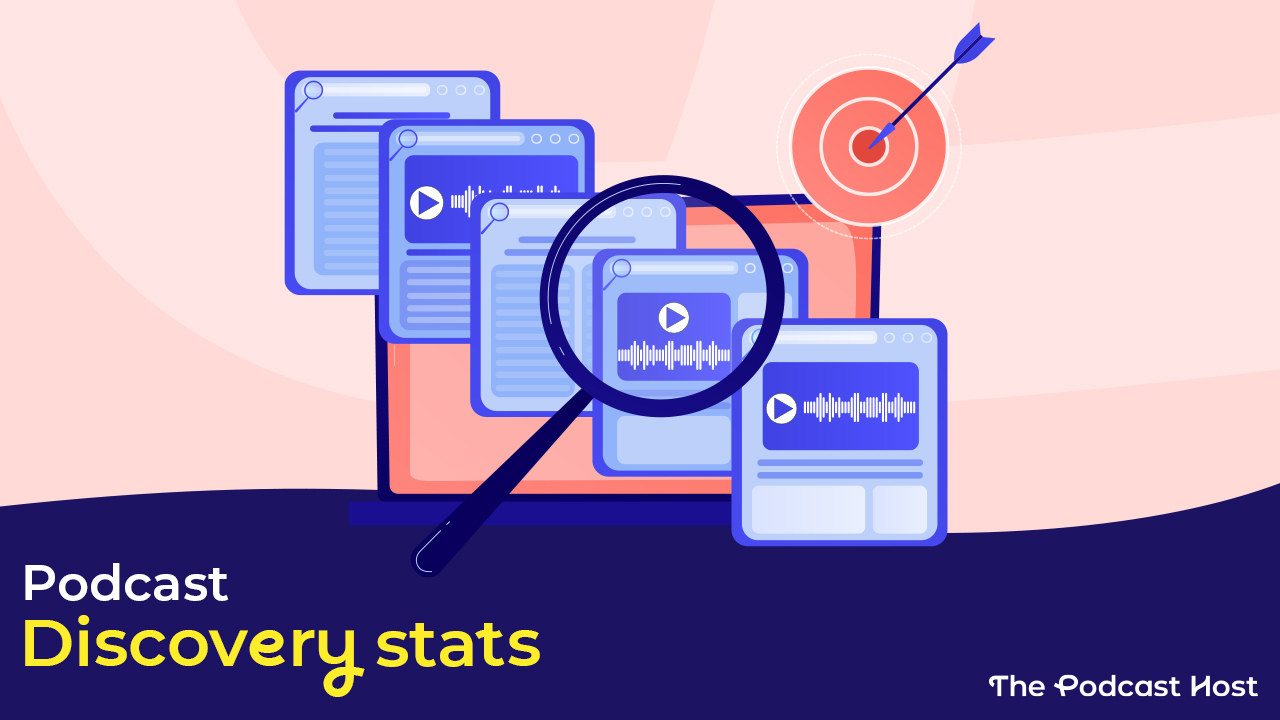
Podcast Discovery Stats: At-a-Glance
- 780 people took this survey, 41% of them have never run a podcast
- 40% prefer to search their listening app’s directory to discover new podcasts
- Respondents judge podcasts mostly on the description, and then their episode titles
- Respondents largely don’t care if they’ve never heard of the podcaster, or their guest
- 28.9% of respondents will give a show up to 15 minutes to “hook” them
- 27.5%, on the other hand, will only give it 5 minutes
- The vast majority of respondents are fine with ads in podcasts, within reason
- The data suggests that going too long can lose you more listeners than going too short
- There was no difference in the data from the 41% of people who have never podcasted before, to the 59% who have
- Read on for the full data and report…
Podcast discovery habits remain varied amongst listeners in 2020. If you ask someone how they find a website, chances are, they’ll say “I Google it”. Ask them how they find a video, and they’ll probably tell you they’d type a search term into YouTube.
Ask a room full of 30 podcast listeners how they discover new podcasts, though, and you might get 30 different answers.
Is There a Podcast Discovery Problem?
Some might see this as a podcast discovery problem. They’d argue that it’d be better for everyone if there was one single thing listeners did when looking for new shows to consume.
The counterargument might be that the status quo means there are fewer “gatekeepers”. Podcasters are largely in control of how “discoverable” their content is. They decide what to call their show, how to title their episodes, and how much time to spend on good SEO practices.
If there was one single place everyone went to find new podcasts, would that be a good thing? For starters, charts are controversial, because they are either curated by someone, or can be gamed. It’s also debatable how much attention listeners give to these, as you’ll see in the data.
And search results still need to be “ranked”. If there are 500 cycling podcasts, you can’t just spit these results out equally on a page. If all 500 cycling podcasters were creating brilliant content, someone would still need to be 500th on the list.
So Why Run This Podcast Discovery Survey?
We wanted to get some insights into how podcast listeners discover new content.
But there’s more to a listener’s podcast discovery journey than simply seeing a potentially interesting show. There are going to be factors that they’ll judge each find on.
Does poor artwork put them off? Does it matter if they’ve heard of the presenter? Do they care about ratings and reviews? What if the episodes are all quite long? Or what if they don’t have much of a back catalogue?
And if they finally do decide to hit play, how long will the podcast have to “hook” them, before they switch off?
A decent sample of data is useful for listeners and podcasters alike. For content creators, they’ll have a better idea of where to direct their time and attention to. And, in turn, that’ll make it a better listening experience for the consumers.
For this podcast discovery survey, we partnered with one of our favourite gear companies, Samson. Everyone who took part will be entered into a prize draw with the chance to win some shiny new kit. We’ll be doing this prize draw in the coming weeks.
We also partnered with Podchaser – your daily source for podcast discovery.
Often referred to as “the IMDb of podcasting”, Podchaser has a range of excellent features for podcast listeners and podcasters alike. The platform enables you to create your own profile, then link that profile to all the shows and episodes you’ve ever been involved in. Or, you can simply use it to follow your favourite podcasts, and discover new content!


We’d like to thank both Podchaser and Samson for helping to make this survey a huge success.
Before we dive in and start looking through the data from all 780 participants, a quick word on our survey methodology.
Methodology
Firstly, a little about the methods we used for this survey.
We set up a survey on our own site, using Typeform. This asked every one of the questions below and allowed respondents to fill in their thoughts.
We worked to promote this as widely as we could, primarily by inviting responses through our email list, banners on our site here, and on our social media. We also asked friends and partners in the industry to help promote it through their own channels, and many were kind enough to do so. As mentioned above, Samson and Podchaser shared the survey with their own audiences on their social platforms.
We received 780 responses, in total, after this promotion. This felt, to us, enough to draw some decent conclusions.
In terms of limitations, I acknowledge that these are mainly responses from people who follow our content and who are part of our audience. This was mitigated in part by asking as many others to help us promote the survey as possible, but there’s no doubt still a bias towards our own audience. This could influence the results.
Our audience has grown throughout years of being found on Google, and via the podcast, so it has come from a relatively broad base. Anecdotally, we’ve always received questions through the entire gamut of podcasting, from launch to full monetisation, so I feel we have a diverse range of experience in our audience.
Our web analytics demographics show a reasonable spread across age, gender and country of origin. Our content category stats show a bias towards beginners content, but later-stage content like growth, monetisation, presentation skills and the like still get a lot of attention. There are, after all, a lot more beginner podcasters than those who have stuck with it for a few years!
In future surveys, I think we could do better at reaching other communities, groups and types of podcasters to make sure we’re representing the entire industry, here. I’ll commit to working with even partners to make sure we gather those opinions – watch this space for the next edition and an updated methodology!
780 People Took The Survey: How Many are Podcasters?
A somewhat cynical view of surveys like these is that all the data comes from podcasters themselves, and not podcast listeners. But are the two so mutually exclusive?
There’s a big overlap here, and we shouldn’t look to drive a wedge in-between both camps. If someone’s capable of using an app to listen to podcasts, they can just as easily grab an easy-to-use podcast making app and have a bash themselves. Many do.
With that said, we wanted to find out exactly how many participants “do, or have ever” run their own podcast.
- 59% do, or have run their own podcast
- 41% have never run their own podcast
In the 59% camp, you could have 300+ episode podcasting veterans, but you could also have a lot of people who recorded a clip on their phone and uploaded it to Anchor 3 years ago.
We also analysed the survey results of the 41% camp alone, and found that they were almost identical to the overall results. We’ll talk more about that a bit further on, for what it’s worth.
For now, let’s crack on to the podcast discovery habits…

How Do Listeners Search for New Podcasts?
What do our respondents do first when they want to find a new show to listen to? This is arguably the most interesting section of all, because it’s entirely based on listener habits. What’s that first port of call for discovering new content?
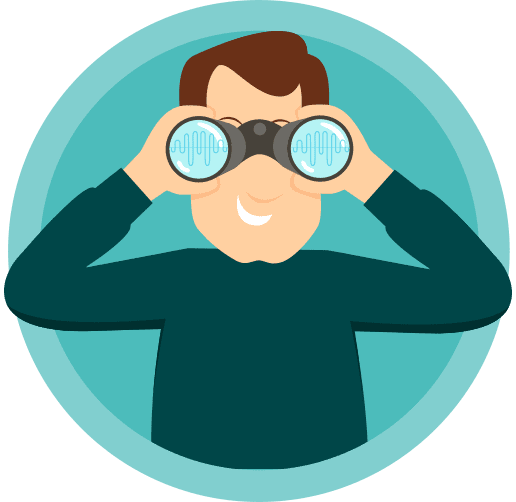
We asked the question “You want to find a new podcast to listen to. What do you do first?”
Searching in their podcast listening app’s directory was the clear winner here with 40% of the vote. There was a follow-up question to this answer too – “If you use your listening app’s directory to find a show, how do you search?”
- 58.1% of folks who search their listening app’s directory type the topic into their app’s search bar, and choose from the results
- 41.9% prefer to browse the categories to find new shows
Away from those who take to searching their listening app, the other results were;
- 18.3% Directly ask someone I know who likes the same stuff
- 15.2% Ask on social media or in an online community
- 13.6% Search on Google
- 13% Browse through a podcast chart or ‘featured’ section
Not much to split the above, but it does show the importance of word-of-mouth marketing.
How Do Listeners Judge Potential New Podcasts?
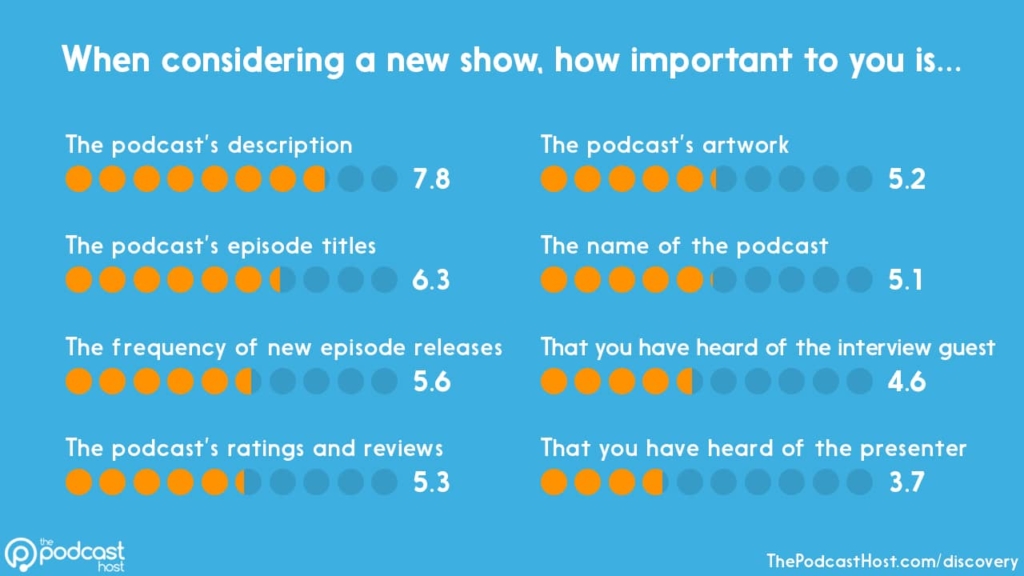
This is a really interesting area to dive into. Once a listener spots a podcast that has piqued their interest, what does their mental checklist look like? What sort of things are they judging the podcast on, as they weigh up whether or not to hit play, and give it a shot?
Participants were asked “When considering a new show, how important to you is…”.
This was graded out of 10, with 0 being not important at all, and 10 being of utmost importance.
- The podcast’s description – 7.8
- The podcast’s episode titles – 6.3
- The frequency of new episode releases – 5.6
- The podcast’s ratings and reviews – 5.3
- The podcast’s artwork – 5.2
- The name of the podcast – 5.1
- That you have heard of the interview guest – 4.6
- That you have heard of the presenter – 3.7
Key takeaways, then. You need a good summary for your show. This should be more about the listener than the podcast creator. What can they expect if they hit play? What are they going to get from it?
Here’s our full guide to writing a great podcast description.
Your episode titles matter a lot (they’ll also help you in search) so don’t just call them “Episode 15”, “Episode 20”, etc. Here’s a handy guide to podcast episode titles.
3-6 are clustered with not much to split them. It’s worth noting that the name of your podcast still matters a lot, though. Remember that 40% of the people taking this survey search for new content in their podcast’s listening app. If your show is called “Jim’s Podcast”, that might not lead many people to think, “At last – Jim’s Podcast! The perfect show for me! The answer to all my questions, struggles, and pain points!”.
Here’s our guide to podcast names for a deeper dive on that topic.
Finally, very few respondents care whether or not they’ve heard of you. So that helps dispel any “why would anyone want to listen to me?” reservations about starting a podcast.
And chasing “famous” interview guests might not be the ultimate audience growth tactic many once believed it to be.
How Long Does a Podcast Have to “Hook” a New Listener?
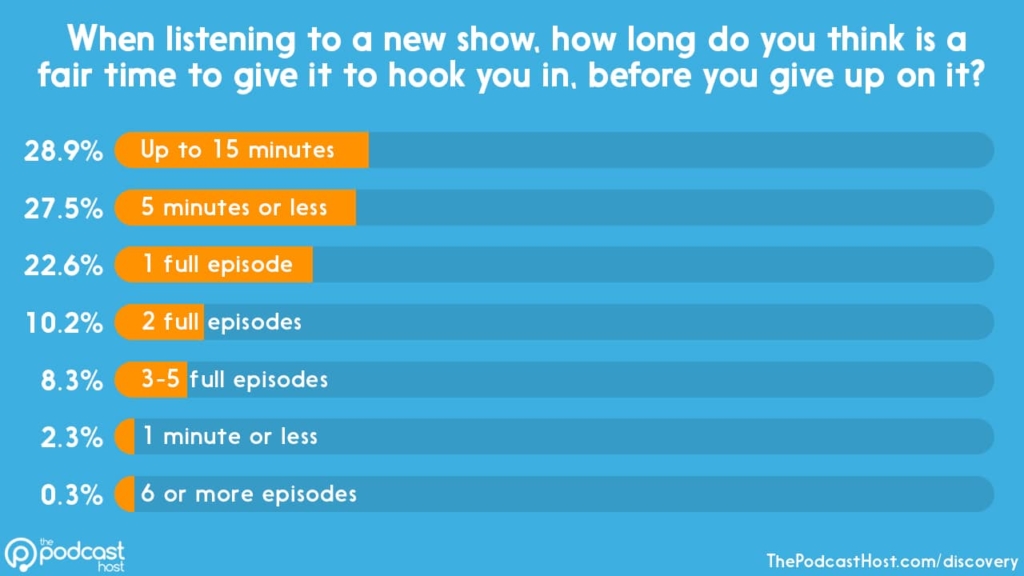
Is your 2-minute-long theme tune and 10 minutes of opening banter harming your podcast’s growth? Probably.
28.9% of participants will give you a generous 15 minutes to offer them something worth sticking around for. But for 27.5%, you only have up to 5 minutes to hook them.
22.6% will give you the full episode. For an extremely demanding 2.3%, you have less than a minute, whilst a forgiving and optimistic 0.6% of respondents will sit through 6 or more episodes hoping for something good.
To be fair, with the longer times here, we should probably consider fiction podcasts and audio drama listeners. Storytelling audiences may be more patient than the listener who’s hitting play to find out the quick answer to a problem or struggle.
Potential Turn-Offs
Content aside, what are some of the things that cause listeners to opt out of a newly-discovered podcast? Audio quality, adverts, and episode length are three things that spring to mind. We asked our respondents about them in the survey.
Advertising
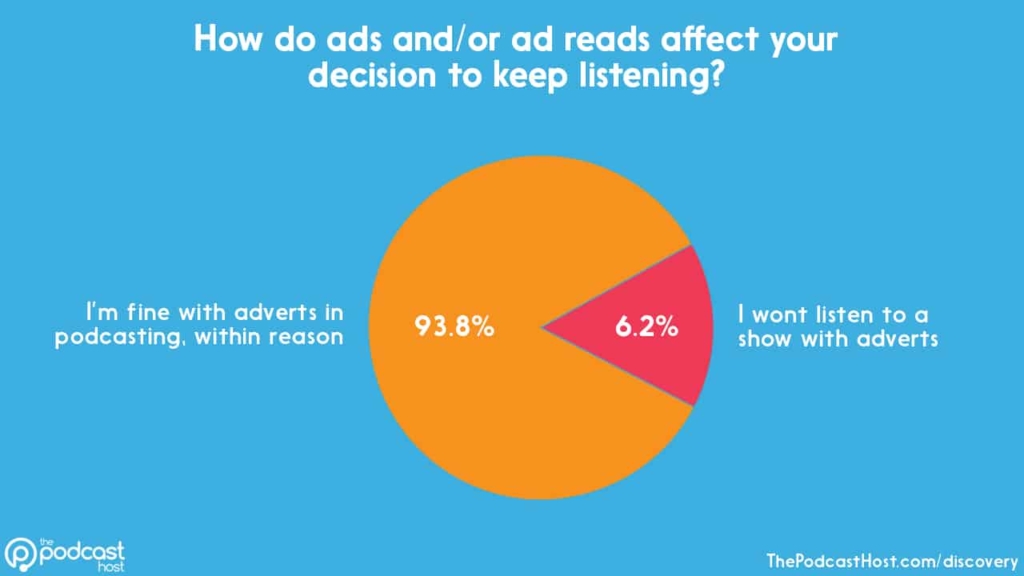
We asked, “How do ads and/or ad reads affect your decision to keep listening?”
The good news for podcasters running a bit of sponsorship, is that 93.8% of respondents are “fine with adverts, within reason.” 6.2%, on the other hand, “won’t listen to a show with adverts”.
Audio Quality
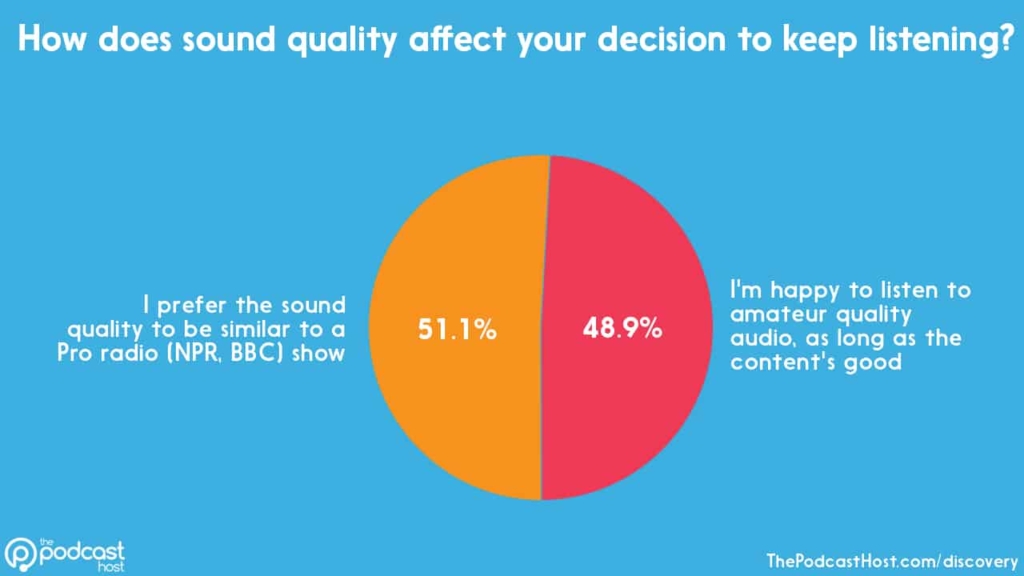
We asked, “How does sound quality affect your decision to keep listening?”
There was a real split here. 51.1% of respondents prefer the sound quality to be similar to “pro radio” (BBC, NPR, etc). On the other hand, 48.9% are happy to listen to “amateur quality” so long as the content is good.
Fortunately, getting a good level of audio quality these days doesn’t need to be difficult, or expensive. Here’s our handy guide to recording a podcast.
Episode Length
There isn’t an optimal podcast episode length, because it always depends on the content.
That said, do some listeners scan through a list of episodes and think “too short”, or, “too long”?
We posed this question in two different ways, and the winning answer was “I don’t care about episode length.” But… it’s worth noting the other answers. Let’s take a look:
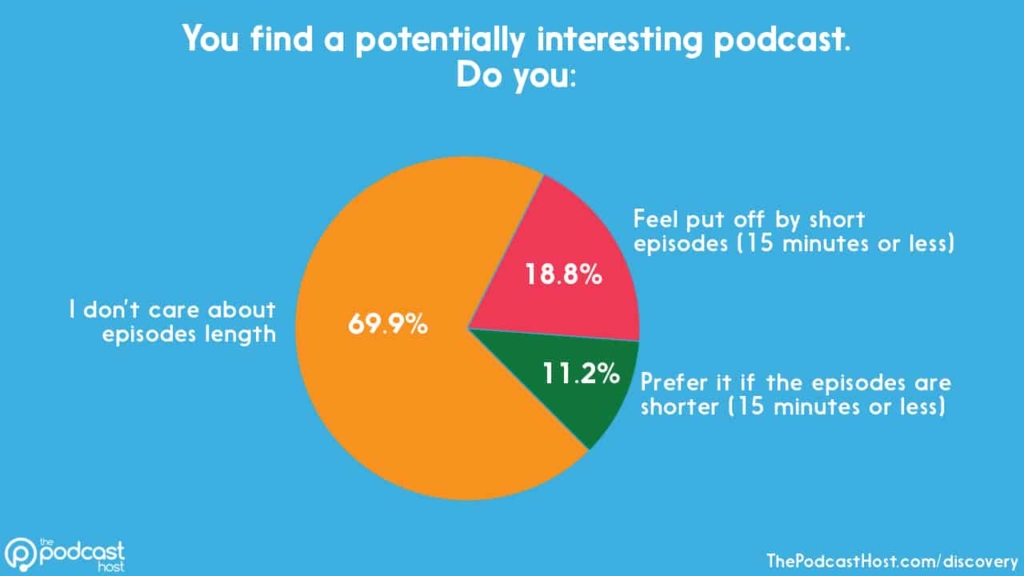
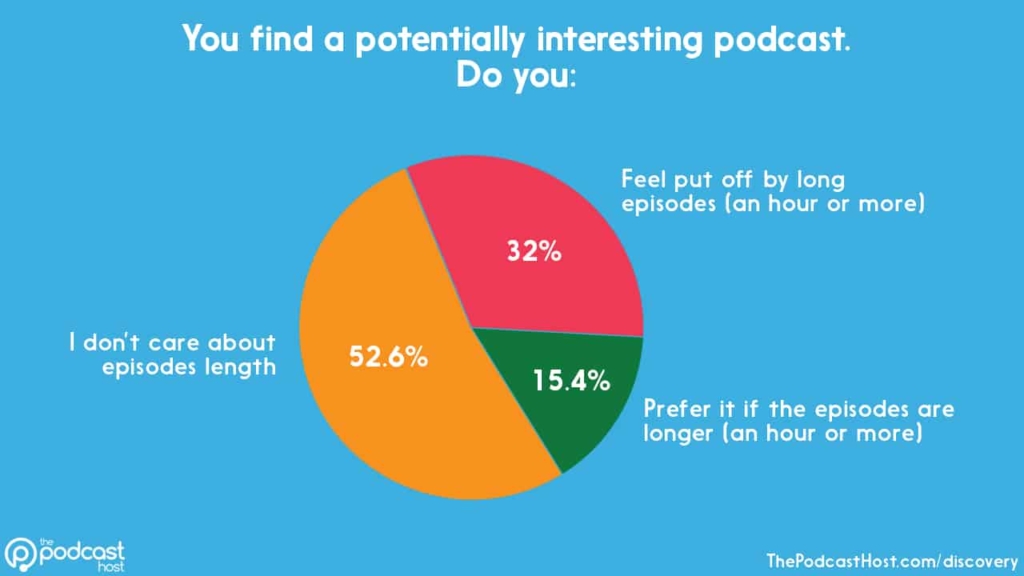
In the first question, 18.8% of respondents said they “feel put off by shorter episodes of 15 minutes or less”. And in the second question, 32% said they “feel put off by longer episodes of an hour or more”.
This suggests you’re more likely to put off a potential listener by going too long than too short. And while most don’t care about episode length, 32% is a reasonable proportion of listeners to lose if you do go long…
Key takeaway? Different people like different types of shows. So, your podcast episode lengths should be determined by the content within them, and little else. But, be aware that 1hr+ episodes have become a negative to around 1/3 of respondents. So, if you’re going long, make sure it’s a deliberate choice. Make sure that you know the remaining 66% will love it even more, because of the length.
Here’s an article on how long podcast episodes should be, for a deeper dive on that front.
Does Your Back Catalogue Have an Impact on Potential New Listeners?
63.7% of respondents said a podcast’s back catalogue had no impact on whether or not they decided to listen.
16.5% prefer podcasts to have a small number of episodes, so they can catch up easily and follow along. On the other hand, 15.9% prefer them to have a big back catalogue of hundreds of episodes.
Only 3.9% don’t listen through the back catalogues of shows they like. This means that when you get one new listener, you’re potentially getting dozens of new downloads.
Unusual Ways Listeners Have Discovered New Podcasts
Let’s switch gears and look at some anecdotal responses now. We asked the question, “What’s the most unusual way you’ve ever found a podcast?”
Here’s a small sample of some of the answers…
- An advertisement on a lamp post.
- A typo when searching for a different podcast in a podcast directory’s search feature.
- My tinder date recommended her own podcast.
- Standing in line at a coffee shop, peeking over the shoulder of the person in front of me.
- At a restaurant, written on a wall.
- A sticker on the subway.
- One of my Lyft passengers turned me on to an interesting podcast.
- It was mentioned in a film.
- I saw that someone at a bar was enjoying a podcast. I asked what it was.
- I met someone listening to a podcast on the same bus as me.
- On a dating app.
- From a random person in the grocery store.
- It was written on a bathroom stall.
- I met a guy on the sideline of a soccer game. He had the equipment and was starting one. Motivated me to start one also!
- I was on my way to an interview for grad school and talking to a professor. She made a side comment about her husband working for a podcast network, and I now listen to their podcasts.
- I found one while reading a fiction novel.
- Through commenting on a Facebook post (the host of a podcast then asked if I would come on as a guest, which I did and have been listening ever since).
- I saw a podcast advertised on a magnet at the museum.
- Overheard people talking about it while in an airport, which prompted me to find it in Apple Podcasts.
- Really enjoying someone’s blog and thinking, “gosh I hope they have a podcast,” then searching for the podcast and FINDING IT.
- Searching for a random topic on twitter and getting hooked by a funny episode description that was posted.
- Saw it on a t-shirt a guy wore at the airport.
- Via a QR code.
- Someone’s tattoo.
- Signing autographs in my book at a book event. One of my readers said – because of your writing, I know you’ll LOVE this podcast.
- Through reading fanfic.
- Searching for Irish accents.
- Via a bad review.
- A sticker on an elevator door.
- I saw on a flyer on the side of a bin.
- A poster in the vets.
- A bumper sticker on a car.
Do these give you any ideas for your own podcast promotion efforts? If so, you might want to have a read of our articles on guerrilla marketing, and how to do podcast merch.
Data From Those Who’ve Never Run a Podcast Before
We isolated the data gathered from the 320 participants who had never podcasted before. We found that there were no significant differences in any of the answers.
To look into these is very much a case of splitting hairs, but here are the highlights:
App directory search remained the most popular method of looking for new content. This was up a little from 40% to 42.6%. Google search was one of the biggest movers in the entire survey, up from 13.6% to 17.6%.
15 minutes remained the most popular timeframe shows have to “hook” listeners. That moved down a little from 28.9% to 27.5%. It was again closely followed by 5 minutes, down to 23.5% from 27.5%.
Show description and episode titles remain comfortably the 2 biggest factors respondents are looking at before hitting play. The only change in the order here was that artwork dropped down to 7th place.
8.2% won’t listen to adverts in podcasts, which was up above the overall figure of 6.2%.
The question of Pro Vs Amateur audio was a 50/50 split, which was very similar to the overall 51.1% in favour of Pro sound quality.
And on the question of episode length, the bulk of respondents, again, don’t really care. 12.2% prefer shorter (up from 11.2%) and 33.2% feel put off by episodes of an hour or more (up a smidge from 32%).
So in summary, there’s really no difference in the data from one camp to the other. But it was worth checking anyway 🙂
Podcast Discovery is up to the Podcaster
There’s no doubt that many people will continue to explore and invest in ways to solve what many believe is a need in podcasting. Whether or not someone will invent some incredible solution, and it’ll be adopted by the majority of podcast listeners, is another matter altogether, though.
For me, the bottom line is that the onus lies with podcasters themselves. If you run a podcast, it’s up to you to make sure your show is discoverable. No one else. Our friends over at Rebel Base Media wrote a great piece on this, and the fact that every podcaster is the marketer of their own brand. You can read about their Podcast discoverability triangle over there.
Here are a couple of resources from ourselves too, that might be useful.
There is no silver bullet answer here. There are a plethora of factors that go into your podcast discovery.
You need to make something really good that people love, and will talk enthusiastically about to their friends. You also need to show up consistently over a long period of time.
Community and conversation are vital to podcast discovery, as we can see clearly in these results. No matter what your podcast topic is, there’ll be a community based on that niche, and you should be part of it.
Don’t just be someone who talks about their own podcast either. Share and promote the other shows that you love – that alone will encourage people to check out your work.
Then there’s the more tangible stuff. Many podcasters severely restrict their audience growth due to factors like their show name, description, episode titles, and website. It’s all about stacking the conditions in your favour as much as possible.
Podcast Discovery Survey: Summary
So to wrap things up, here the key takeaways;
- 780 people took this survey, 41% of them have never run a podcast
- 40% prefer to search their listening app’s directory to discover new podcasts
- Respondents judge podcasts mostly on the description, and then their episode titles
- Respondents largely don’t care if they’ve never heard of the podcaster, or their guest
- 28.9% of respondents will give a show up to 15 minutes to “hook” them
- 27.5%, on the other hand, will only give it 5 minutes
- The vast majority of respondents are fine with ads in podcasts, within reason
- The data suggests that going too long can lose you more listeners than going too short
- There was no difference in the data from the 41% of people who have never podcasted before, to the 59% who have
It has been a lot of fun to dive into this data and put the report together. Thanks once again to our pals at Podchaser and Samson for partnering with us to make it a great success. Thanks also to all of the respondents who took the time to fill it out.
Finally, if you’re a podcaster (or would like to be), then why not join us in Podcraft Academy? In there, you’ll find all our video courses, downloadable resources, and weekly live Q&A sessions. We’ll help you make a show that’s discoverable by all. One that’s talked about enthusiastically on Tinder dates, written on the walls of public toilets, and even tattooed onto people’s arms!
